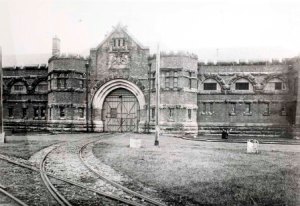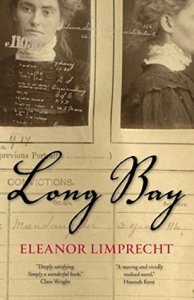 For most Australians the name of Long Bay is familiar only from news reports about hardened criminals. Its proper name is The Long Bay Correctional Complex, a.k.a.Her Majesty’s Australian Prison Long Bay and I was surprised to learn that it houses minimum security inmates, male and female, as well as the notorious maximum security prison. You can see from the photo how forbidding it looked in the 1900s, round about the time that Rebecca Sinclair started her three years Hard Labour, convicted of manslaughter for having performed an abortion on a woman who subsequently died. It is her story that is fictionalised in Eleanor Limprecht’s compelling novel…
For most Australians the name of Long Bay is familiar only from news reports about hardened criminals. Its proper name is The Long Bay Correctional Complex, a.k.a.Her Majesty’s Australian Prison Long Bay and I was surprised to learn that it houses minimum security inmates, male and female, as well as the notorious maximum security prison. You can see from the photo how forbidding it looked in the 1900s, round about the time that Rebecca Sinclair started her three years Hard Labour, convicted of manslaughter for having performed an abortion on a woman who subsequently died. It is her story that is fictionalised in Eleanor Limprecht’s compelling novel…
 The novel is bookended by Rebecca’s time in prison but it is the backstory that I couldn’t put down. Rich in period details but narrated in the present tense to create a sense of immediacy, the book brings Rebecca to life as we learn the extraordinary events which led to her imprisonment.
The novel is bookended by Rebecca’s time in prison but it is the backstory that I couldn’t put down. Rich in period details but narrated in the present tense to create a sense of immediacy, the book brings Rebecca to life as we learn the extraordinary events which led to her imprisonment.
She was born into poverty in pre Federation Sydney, where her father had died when she was small. Her mother Lizzie is too proud to accept charity and has supported her six children with fine needlework, but they are often still hungry. One by one they all leave school as soon as they can, the girls helping with the sewing and minding Ruby who at fifteen still has the mind of a child, and Louis losing a succession of jobs for reasons as colourful as his clothes. Helen dies of a cough that will not shift.
For women, there were few options to escape this drudgery. Lizzie won’t accept the money that Violet makes in her gaudy clothes because it is sinful money, while Amy marries into a comfortable home where the only liability is her philandering husband. And fatefully, Rebecca meets Don Sinclair, a charming man with a bit of money to splash around. It would spoil the story to tell much of it: suffice to say that a time comes when Don thinks that the work his mother does in her ‘private hospital’ is easy money, and that Rebecca’s need to support her child makes her too weak to withstand him.
The real strength of this novel is the characterisation of Rebecca, a flawed woman who makes too many compromises. She realises early on that she has made a mistake with Don, but she is trapped by her pride and her unwillingness to retreat home into poverty.
As he speaks, as night falls, the ruse becomes clear to her. The lies grow together like the links of a chain. It is as if he is an ironmonger, holding their marriage to the fire, melting it down and hammering it into something unfamiliar. Something dreadful and heavy, clasping her. A weight she could spend a lifetime trying to shake free. (p.197)
Women were so very much at the mercy of men in those days. Lizzie depends for work on the man who brings her piece work; the women in the garment factory can be sacked or have their pay docked for the most trivial of reasons. When Amy’s drunken husband John tries it on with Rebecca on the night of his wedding, it is she who feels shame. When Lizzie’s loneliness and failing eyesight makes her accept a man who comes courting, it’s her vulnerable daughter Ruby who has to be got rid of into an asylum, because he doesn’t like her. And perhaps worst of all, in the years before birth control, is the way women’s bodies betrayed them with unwanted pregnancies
They are coming out of the woodwork, these women, knocking at Nurse Sinclair’s door, writing letters, putting advertisements in the paper to try to find her. They have six children already and the husband has lost his job, or they are not married and their family will put them on the streets in shame, or they are servants and the master has taken liberties, taken advantage, kicked them out when the consequences might no longer be hidden. (p.144)
This a fine novel. It breathes authenticity but it wears its research lightly. My only quibble is with the ending, which didn’t quite mesh with the unsentimental tone of the novel overall. But perhaps because I had become fond of Rebecca as a character, I found myself feeling quite pleased about it all the same…
PS Sue at Whispering Gums enjoyed it too.
PPS And see an interview with Eleanor Limprecht at Adventures in Biography, thanks for the link Michelle!
Author: Eleanor Limprecht
Title: Long Bay
Publisher: Sleepers Publishing, 2015
ISBN: 9780987507044
Source: personal library, purchased from Benn’s Books Bentleigh, $24.95
Also available from Fishpond: Long Bay and other good bookstores.
Update Feb 2022: This title is now available through the Untapped Australian Literary Heritage Project. It can be borrowed electronically through libraries and can be purchased in digital form from eBook sellers. For details visit the Untapped website.


Sadly this is available in uk only as a kindle version. Maybe if I hang on if will come out in paperback which I’d prefer.
LikeLike
By: BookerTalk on July 16, 2016
at 8:44 am
I suspect not… Sleepers is a very small indie publisher and they may not have the reach to do print copies overseas. But you could ask them, they’d probably be delighted to know that this book interests you over there in the UK! See http://sleeperspublishing.com/about/ for contact details.
LikeLike
By: Lisa Hill on July 16, 2016
at 9:15 am
Great idea…..
LikeLike
By: BookerTalk on July 19, 2016
at 6:04 am
From the example of writing, you’ve quoted it sounds a fine novel indeed – I love writers who can make history live and breathe in a memorable way. And it’s funny but I always thought Long Bay was a male prison and Silverwater the female prison so in your first couple of paragraphs you enlightened me:) (That’s not to say your excellent reviews are not always enlightening, LIsa!)
LikeLike
By: mairineilcreative writer on July 16, 2016
at 8:56 am
Yes, that’s what I thought too.
Wikipedia says they’re building a whole new complex…
LikeLike
By: Lisa Hill on July 16, 2016
at 9:17 am
I read this book last year and found it fascinating. Women really didn’t have choices and men had so many! I was surprised that Rebecca could keep her baby in jail. Obviously details were well researched and woven well into a good read.
LikeLike
By: Meg on July 16, 2016
at 11:15 am
I know this an ‘historical’ novel but it makes clear why Miles Franklin and so many others eschewed marriage. I’d be interested to know the first contemporary instance of abortion in Aust fiction. The earliest I can think of is Ride on Stranger in the 1930s
LikeLike
By: wadholloway on July 16, 2016
at 12:38 pm
That’s an interesting question… the most vivid I can think of is later than that, in one of Ruth Park’s novels…
LikeLike
By: Lisa Hill on July 16, 2016
at 2:53 pm
Like Meg, I read this last year. I had a few quibbles too, partly because I can’t help thinking Limprecht was a little hampered by knowing Rebecca’s family would be reading the novel. (That’s my assumption, not something Limprecht herself has said). However, I enjoyed it immensely. Her evocation of the period and particularly of women’s lives makes for excellent reading.
LikeLiked by 1 person
By: whisperinggums on July 16, 2016
at 2:53 pm
That’ll teach me not to write reviews in the middle of the night, I knew you’d read it (that’s why I bought it) but I forgot to link!
LikeLike
By: Lisa Hill on July 16, 2016
at 3:12 pm
Another one to add to my wishlist – great review Lisa.
LikeLike
By: sharkell on July 16, 2016
at 5:40 pm
LOL, I think I’ve been a bad influence on your budget!
LikeLike
By: Lisa Hill on July 16, 2016
at 5:49 pm
I’ve just signed up to an audiobook provider as I’m unable to keep up with all of the books I want to read!
LikeLike
By: sharkell on July 17, 2016
at 7:50 pm
How will you listen? while you’re driving? Or ironing? Or just loafing in the sun?
LikeLike
By: Lisa Hill on July 17, 2016
at 9:13 pm
I listen when I’m driving and gardening. And if no-one’s in the house I also listen when I’m doing housework. I’ve listened to 5 audiobooks so far this year – it works well for me but the libraries (and I am a member of 3) have fairly limited selections.
LikeLike
By: sharkell on July 18, 2016
at 6:30 am
Yes, I suspect they are clearing their stock down because so many people have books on iPods instead.
LikeLike
By: Lisa Hill on July 18, 2016
at 9:18 am
So glad you enjoyed ‘Long Bay’. So did I, so I interviewed Limprecht last year – the interview is here: https://adventuresinbiography.wordpress.com/?s=limprecht
LikeLike
By: MST on July 16, 2016
at 10:01 pm
Although I couldn’t put this book down at the time, it did miss the mark a little for me in terms of what I look for in historical fiction – I didn’t get a strong sense of place unfortunately. I was also reading it with Kate Manning’s My Notorious Life in mind – a similar book (which was extremely evocative of time and place).
LikeLike
By: Kate W on July 19, 2016
at 6:48 am
‘My Notorious Life’ – that’s a book I don’t know…
LikeLiked by 1 person
By: Lisa Hill on July 19, 2016
at 7:02 am
Worth looking up – a ripping read.
LikeLiked by 1 person
By: Kate W on July 19, 2016
at 7:58 am
[…] Though I enjoy escapist reading occasionally, more interesting to me is the historical novel which aims to shine a light on some aspect of past life, (including a sub-genre based on a real life which I’ve tagged Rescue A Woman from Oblivion). Australian examples of these from my recent reading include The Birdman’s Wife by Melissa Ashley about the forgotten wife of John Gould (see my review); Jill Blee’s novels about the Irish in Australia; Crimes of the Father by Tom Keneally which explores clerical child abuse (see my review); and Long Bay by Eleanor Limprech based on the true story of a woman gaoled for performing abortions in the Federation era. (See my review). […]
LikeLike
By: Treading Air, by Ariella Van Luyn | ANZ LitLovers LitBlog on May 22, 2017
at 1:31 pm